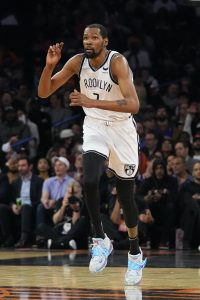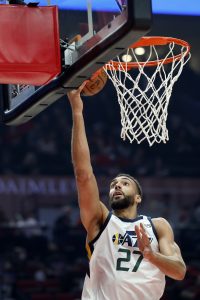No Hoops Rumors writers are among the 100 media members who voted on the NBA’s award winners in 2022, but we still have some thoughts on which players are most deserving of hardware for their performances this season.
Here are our choices for the six major awards:
Rory Maher
There are plenty of statistics that indicate Jokic was the NBA’s Most Valuable Player, but these are the most convincing, in my opinion: Denver was +19.5 points per 100 possessions better with Jokic on the court vs. off (compared to +11.3 for Joel Embiid and +10.8 for Giannis Antetokounmpo), per Cleaning the Glass. And despite missing their second- and third-best players, the Nuggets had a .622 winning percentage when Jokic played (a 51-win pace), compared to .250 when he didn’t (a 20.5-win pace).
Mobley and Scottie Barnes were neck-and-neck for Rookie of the Year for me, but I gave Mobley the edge due to his defensive impact.
The Jazz had a 104.5 defensive rating when Gobert was on the court — 1.7 points stingier than Boston’s league-leading mark — and he led the league in rebounding, was third in blocks, and opponents shot significantly worse than expected when he was defending them.
Bane was a solid rotation player as a rookie and a borderline All-Star as a sophomore, nearly doubling his scoring average (9.2 PPG to 18.2 PPG) while maintaining fantastic efficiency for a 56-win Grizzlies squad (the team was just 3-3 without him). There were many other worthy candidates, including Tyrese Maxey, Darius Garland, Jordan Poole, Dejounte Murray, Josh Hart and Jarrett Allen. I didn’t seriously consider Ja Morant because putting a player who was already really good as MIP just felt…wrong.
Herro and Williams look like well-earned shoo-ins for their respective awards, but Taylor Jenkins, J.B. Bickerstaff, Nick Nurse, Erik Spoelstra and Ime Udoka also deserve recognition for leading their teams through a challenging season.
Dana Gauruder
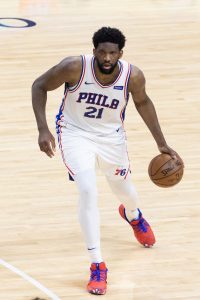 Embiid gets the nod over Jokic and several other worthy candidates because his stellar play saved the Sixers’ season despite the turbulence caused by Ben Simmons. Controversies and awkward situations typically tear teams apart. Embiid carried Philadelphia to a tie for the second-best record in the East – the Sixers were 45-23 when he played and just 6-8 without him.
Embiid gets the nod over Jokic and several other worthy candidates because his stellar play saved the Sixers’ season despite the turbulence caused by Ben Simmons. Controversies and awkward situations typically tear teams apart. Embiid carried Philadelphia to a tie for the second-best record in the East – the Sixers were 45-23 when he played and just 6-8 without him.
Cunningham got off to a slow start after spraining his ankle in training camp. He lived up to his status as the top pick after the All-Star break, averaging 21.1 PPG, 6.5 APG and 5.7 RPG. He gets a slight nod over Mobley and Barnes.
The Suns rolled to the best record in the league behind a defense that held opponents to the third-worst field goal percentage. Bridges was usually assigned to the other team’s top offensive threat and quietly shut many of them down.
Herro is the easiest pick among the awards. He averaged 20.7 PPG and 4.0 APG in 32.6 MPG for the team with the best record in the East.
The Warriors had to wait for Klay Thompson to return, then lost Stephen Curry for the last few weeks of the season. Poole filled the scoring void during those absences, averaging 18.5 PPG and 4.0 APG in his third season.
The Grizzlies went from four games over .500 last season to 30 games above .500 this season. Even when Morant was injured late in the season, Memphis continued to win. Jenkins deserves plenty of the credit for the dramatic improvement.
Arthur Hill
- Most Valuable Player: Nikola Jokic (Nuggets)
- Rookie of the Year: Evan Mobley (Cavaliers)
- Defensive Player of the Year: Marcus Smart (Celtics)
- Sixth Man of the Year: Tyler Herro (Heat)
- Most Improved Player: Ja Morant (Grizzlies)
- Coach of the Year: Taylor Jenkins (Grizzlies)
Jokic’s brilliance kept the Nuggets competitive despite playing nearly an entire season without Jamal Murray and Michael Porter Jr. His offensive production has exceeded what he did when he won the award last season, and his defense has gotten better as well.
Mobley landed on a perfect team for his skill set and he helped the Cavs become a surprise contender. With a unique mixture of offensive talents and a dominating presence on defense, he excelled amid the pressures of a playoff race.
Smart became a full-time point guard this season and played an important role in Boston’s smothering defense. Smart has been openly campaigning for the award, touting his ability to guard all five positions, and there’s a good chance that voters will listen to his argument.
Herro provides Miami with the league’s most dangerous weapon off the bench, averaging 20.7 PPG and shooting 39.9% from three-point range. He has a chance to win several Sixth Man awards during his career if he remains in his current role.
Morant was already really good, but he has taken his game to an elite level during his third NBA season. He posted career highs in every major category and seemed to provide a few highlight-reel plays every night. His presence will make the Grizzlies a difficult playoff matchup for anyone.
No team has exceeded expectations more than Memphis, which climbed to the No. 2 seed in the West. Jenkins gets contributions from nearly his entire roster and has put together a young, exciting squad that is both successful and fun to watch.
Alex Kirschenbaum
- Most Valuable Player: Giannis Antetokounmpo (Bucks)
- Rookie of the Year: Scottie Barnes (Raptors)
- Defensive Player of the Year: Mikal Bridges (Suns)
- Sixth Man of the Year: Tyler Herro (Heat)
- Most Improved Player: Desmond Bane (Grizzlies)
- Coach of the Year: Monty Williams (Suns)
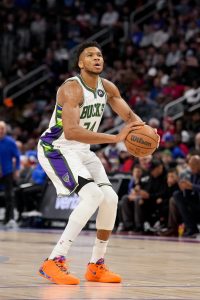 The MVP race has come down to a contest between three big men for the first time in eons, and you can’t go wrong with any of them. Among them, Giannis Antetokounmpo – the reigning Finals MVP and two-time regular season MVP – is the best player on the best team. While Nikola Jokic boasts some surreal offensive stats, I don’t love giving my vote to players on teams that occupy the bottom halves of their conference’s playoff picture. A team’s place in the standings should matter, though the injuries to Jokic’s two best teammates certainly limited Denver’s ceiling.
The MVP race has come down to a contest between three big men for the first time in eons, and you can’t go wrong with any of them. Among them, Giannis Antetokounmpo – the reigning Finals MVP and two-time regular season MVP – is the best player on the best team. While Nikola Jokic boasts some surreal offensive stats, I don’t love giving my vote to players on teams that occupy the bottom halves of their conference’s playoff picture. A team’s place in the standings should matter, though the injuries to Jokic’s two best teammates certainly limited Denver’s ceiling.
Scottie Barnes is a quintessential Masai Ujiri player — a big, switchy, athletic forward who already looks destined to become an impact defender. His game is incredibly fun to watch, and it’s always nice to see players with so much two-way ability get recognized with end-of-year hardware. Between Barnes and Evan Mobley, it has been a heck of a year for big two-way rookies.
Miles Bridges has been a critical and somewhat under-appreciated piece for a stellar 64-18 Suns team that appears to be the heavy title favorite, assuming Chris Paul holds up for four playoff rounds. It’s time for the wings to reclaim this award from the trees! Bridges’s stifling defense has been a crucial cog for one of the best two-way teams in the league. The premiere swingman defender of the 2021/22 season deserves this nod.
Someone on Miami should win something, but that’s not why Herro is the Sixth Man of the Year. He deserves this, as the de facto late game bucket-getter for the top club in an unusually competitive Eastern Conference. His defensive liabilities are the reason he’s a sixth man rather than a starter, but this award isn’t for Starter of the Year, so that’s not really a problem. The 22-year-old third-year guard out of Kentucky, in line for a lucrative contract extension this summer, averaged career-bests of 20.7 PPG (on .447/.399/.868 shooting), 5.0 RPG, 4.0 APG and 0.7 SPG in 66 games for the 53-29 Heat.
I’ve loved to see Desmond Bane’s transformation while with the Grizzlies. It’s always exciting to watch a young non-lottery player (he was the No. 30 pick in 2020 out of TCU) without a traditionally definable role evolve into a crucial part of a playoff contender, and Bane is this year’s model. In his second season, the resilient wing has established himself as the full-time starter for the second seed in the Western Conference. His counting stats have seen a massive uptick from his rookie numbers of 9.2 PPG, 3.1 RPG, 1.7 APG in 22.3 MPG during 2020/21. This season, in 76 games (all starts) for a 56-26 Memphis club, Bane averaged 18.2 PPG, 4.4 RPG, 2.7 APG and 1.2 SPG. He also posted elite shooting splits of .461/.436/.903.
Yes, Taylor Jenkins is nipping at Monty Williams’ heels for Coach of the Year honors this season. But awarding the hardware to Williams for what he’s done with the Suns in 2021/22 is not a “make-up” award (the NBA equivalent of Al Pacino winning his first-ever Oscar, about two decades too late, for Scent of a Woman). Williams was the head coach for the team that has by far been the best in the NBA this year, not an easy feat to achieve following a disappointing 2021 Finals loss. Over the course of his tenure in Phoenix, Williams has taken a lottery-bound 2019/20 club to the class of the league in just three seasons. Yes, personnel moves had an impact on that, too, but Williams has been able to guide the Suns’ many young guns to maximize their potential, alongside the team’s savvy vets.
Luke Adams
- Most Valuable Player: Nikola Jokic (Nuggets)
- Rookie of the Year: Scottie Barnes (Raptors)
- Defensive Player of the Year: Rudy Gobert (Jazz)
- Sixth Man of the Year: Tyler Herro (Heat)
- Most Improved Player: Tyrese Maxey (Sixers)
- Coach of the Year: Monty Williams (Suns)
It’s a brutal year to pick an MVP and a Rookie of the Year — the top three contenders for each award would be runaway favorites in most other seasons and any of them would be worthy winners.
I ultimately gravitated toward Jokic and Barnes, in part because they played significantly more than the other top MVP and ROY candidates. When two or three players are producing at such a similar rate, the one who performed at that level for an extra few hundred minutes is inherently providing his team more value over the course of the season. Jokic’s staggering on/off-court numbers and Barnes’ impressive defensive versatility (he guarded every position and often took on the most challenging perimeter assignments) were also among the deciding factors.
Voter fatigue and Utah’s up-and-down season will likely result in a new Defensive Player of the Year this year, but I couldn’t find a compelling reason not to pick Gobert, who remained elite in 2021/22 and whose presence in the paint does more to alter an offensive game plan than a single perimeter stopper can. Despite a relative lack of strong defenders around Gobert, the Jazz played like the NBA’s best defense when he was on the court and were the equivalent of the league’s 21st-best defense when he sat. Bam Adebayo and Draymond Green rivaled Gobert’s impact, but missed a little too much of the season — 26 and 36 games, respectively.
Most Improved Player is nearly as difficult to pick this season as MVP and ROY, with a larger pool of legitimate candidates. I don’t subscribe to the notion that second-year players don’t deserve this award (sure, they’re “supposed to” improve, but the award isn’t Most Unexpectedly Improved Player), so I’ll give the nod to Maxey, who played the most minutes of any Sixer this season and whose huge jumps in both production and efficiency helped the team withstand Simmons’ absence without missing a beat.
Herro averaged over 20 points per game and shot nearly 40% from beyond the arc for the East’s No. 1 seed, while Williams led the West’s No. 1 seed to a 64-win season (and an incredible +33.4 net rating in “clutch” situations) despite missing Paul for a few weeks in the second half. Herro and Williams are betting favorites for their respective awards for good reason.
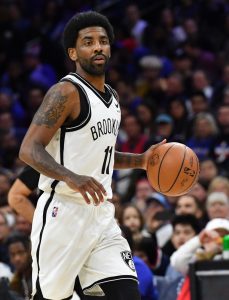
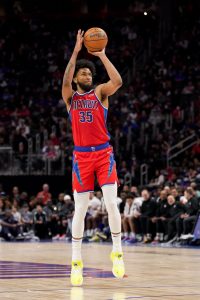 With all that in mind, let’s check in on how this year’s RFAs-to-be will be impacted by the starter criteria. Listed below are the former top-14 picks on track for restricted free agency who did not meet the starter criteria. These players will be eligible for qualifying offers worth $7,228,448.
With all that in mind, let’s check in on how this year’s RFAs-to-be will be impacted by the starter criteria. Listed below are the former top-14 picks on track for restricted free agency who did not meet the starter criteria. These players will be eligible for qualifying offers worth $7,228,448.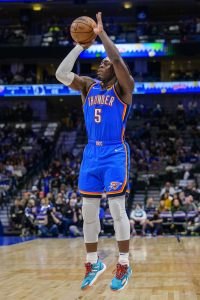
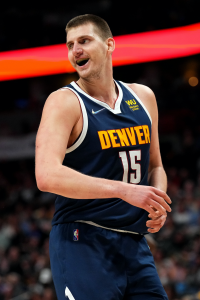
 Embiid gets the nod over Jokic and several other worthy candidates because his stellar play saved the Sixers’ season despite the turbulence caused by
Embiid gets the nod over Jokic and several other worthy candidates because his stellar play saved the Sixers’ season despite the turbulence caused by  The MVP race has come down to a contest between three big men for the first time in eons, and you can’t go wrong with any of them. Among them, Giannis Antetokounmpo – the reigning Finals MVP and two-time regular season MVP – is the best player on the best team. While Nikola Jokic boasts some surreal offensive stats, I don’t love giving my vote to players on teams that occupy the bottom halves of their conference’s playoff picture. A team’s place in the standings should matter, though the injuries to Jokic’s two best teammates certainly limited Denver’s ceiling.
The MVP race has come down to a contest between three big men for the first time in eons, and you can’t go wrong with any of them. Among them, Giannis Antetokounmpo – the reigning Finals MVP and two-time regular season MVP – is the best player on the best team. While Nikola Jokic boasts some surreal offensive stats, I don’t love giving my vote to players on teams that occupy the bottom halves of their conference’s playoff picture. A team’s place in the standings should matter, though the injuries to Jokic’s two best teammates certainly limited Denver’s ceiling.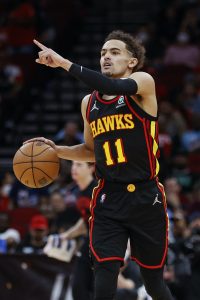 The Hawks and Hornets will each be missing a key player, as big man
The Hawks and Hornets will each be missing a key player, as big man 